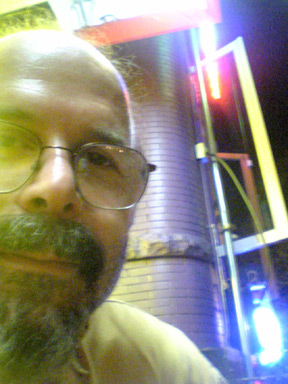dhrupad etc. [Indian classical music notes]
A scholar, Deepak Raja Suvarnalata Rao, published an essay found here: Perspectives on Dhrupad (from Journal of the Indian Musicological Society, 1999). The approach he takes to the topic seems both interesting and somewhat dubious; its gist is suggested by this summary paragraph at the article's conclusion:
/ / / / / / / / /
One can hear Shubha Sankaran's surbahar [excerpts from the "Resurrecting a Raga" CD (2005)] via the CD Baby website. Also, from her Seven Ragas in Seven Talas.
The Prakriti Foundation (in Chennai) held a dhrupad festival last February; their site has good bio-notes about several performers.
The MusicalNirvana site has a couple of good clips of the Gundecha Brothers singing -- especially nice is the 2nd (Komal Rishabh Asavari, 5 min excerpt).
At the present juncture in Dhrupad's history, it is not cynical, but realistic, to analyze Dhrupad primarily as a response to a "market". The genre will merit examination afresh when, and if, it attains the stage of delivering an abundant supply of quality musicianship.At any rate, I found these paragraphs interesting:
From a contemporary perspective, the feasibility of a Dhrupad revival owes a great deal to the towering duo, Ustad Nasir Ameenuddin and Ustad Nasir Moinuddin Dagar. They demonstrated the value of what Indian music was about to lose, perhaps irretrievably. But for their legacy, Indian society might not have mustered the will and the resources to initiate revivalist movements.The website presenting this essay is called Ragascape -- including a musical archive as well as this section of essays (including, for instance, Deepak Raja's good essay, More about the Surbahar).
Their recordings remain, to this day, the most powerful testimony available to the maturity and sophistication of the genre. Their formidable musicianship remains a durable challenge for all vocalists -- Dhrupadiyas as well as Khayaliyas. Their music also earned for them the admiration of serious musicologists in Europe, who helped to create an international constituency not only for Dhrupad, but for all of Hindustani music.
The departure of the Elder Dagar Brothers from the concert platform created the conditions for Dhrupad enthusiasts to clamor for revivalist initiatives. Two significant initiatives, each qualitatively different from the other, are noteworthy. Both of them have attempted to extend the boundaries of musicianship in Dhrupad beyond heredity.
The Bhopal initiative was spearheaded and funded by a state government, with pedagogical and stylistic inputs from one of the streams of the Dagar tradition. In contrast, the Brindaban movement was initiated and funded by the hereditary clergy of a Vaishnava denomination, and functions under the guidance of another reputed Dhrupad lineage, the Mallik family from Darbhanga in Bihar.
The Bhopal initiative has attracted good talent, and so far trained about twenty Dhrupad musicians, of whom a handful are now established concert performers. In terms of its sustainability, this initiative faces two major uncertainties -- the uncertainties associated with all government supported cultural projects, and the scarcity of competent and dedicated Gurus.
The Brindaban movement's contribution to musicianship has been comparatively modest. However, it has utilized the growing interest in the culture of the Vraja region and its Vaishnava cults, to promote the hitherto lesser known Darbhanga gharana.of Dhrupad. The movement claims significance also on account of having restored Dhrupad's link with its original home in the Vaishnava temples. From available evidence, this link appears tenuous, and its long-term value to either Haveli Sangeet or to classical Dhrupad is debatable.
Neither of these establishments has been around long enough to bring Dhrupad to a state of self-generating growth. Dhrupad requires superior momentum to reach such a stage. This will probably come from the future role of the alumni of these establishments as teachers and performers, and the continued growth in Dhrupad's popularity with audiences.
/ / / / / / / / /
One can hear Shubha Sankaran's surbahar [excerpts from the "Resurrecting a Raga" CD (2005)] via the CD Baby website. Also, from her Seven Ragas in Seven Talas.
The Prakriti Foundation (in Chennai) held a dhrupad festival last February; their site has good bio-notes about several performers.
The MusicalNirvana site has a couple of good clips of the Gundecha Brothers singing -- especially nice is the 2nd (Komal Rishabh Asavari, 5 min excerpt).


0 Comments:
Post a Comment
<< Home